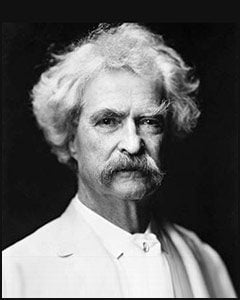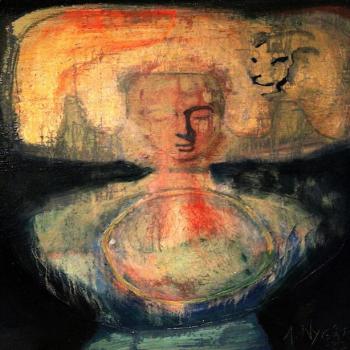 Mark Twain, famed humorist and writer of the classics The Adventures of Tom Sawyer and The Adventures of Huckleberry Finn, is perhaps the most celebrated American author of all time. He is also a favorite of atheists and atheist Web sites, who claim Twain as one of their own. But is their faith in Twain misguided?
Mark Twain, famed humorist and writer of the classics The Adventures of Tom Sawyer and The Adventures of Huckleberry Finn, is perhaps the most celebrated American author of all time. He is also a favorite of atheists and atheist Web sites, who claim Twain as one of their own. But is their faith in Twain misguided?
I stumbled upon the Mark Twain-atheist connection recently, when I went online to verify that a quote came from the author. I found Twain’s name and writings on one atheist Web site after another (Celebrity Atheist, anyone?) and it’s easy to see why non-believers are attracted to him. The author had a knack for writing sharp one-liners like this:
If Christ were here now there is one thing he would not be – a Christian.
While Twain was raised a Presbyterian, and his funeral was held in the local Presbyterian church, he spent much of his life highly critical of organized religion, especially the Christian religion he grew up in. For instance, Twain wrote:
There is one notable thing about our Christianity…ours is a terrible religion. The fleets of the world could swim in spacious comfort in the innocent blood it has spilled.
Twain was often equally hostile to the mixed messages he found in the Bible. He saw the books not as the word of God, but as works of pure fiction:
I believe that the Old and New Testaments were imagined and written by man, and that no line in them was authorized by God, much less inspired by Him.
And while Twain claimed to believe in “God the Almighty”, he also went so far as to say, “If there is a God, he is a malign thug”. Yet, what this and the other cherry-picked quotes you’ll find on the atheist Web sites don’t reveal are Twain’s more nuanced statements on the subject. Take this passage:
I am plenty safe enough in his hands; I am not in any danger from that kind of a Deity. The one that I want to keep out of the reach of, is the caricature of him which one finds in the Bible.
Read the first part of that statement and it’s clear that Twain had developed his own concept of the Almighty, one that was at odds with the God of the Old Testament. He appears to have believed in a just and loving God, which is further evidenced by the quote below:
I think the goodness, the justice, and the mercy of God are manifested in His works: I perceive that they are manifested toward me in this life; the logical conclusion is that they will be manifested toward me in the life to come, if there should be one.
So Twain even leaves open the idea of an after-life. In other instances, his tone softens to the point that he actually seems to see the value of organized religion, even if its benefits don’t relate directly to him:
I am not able to believe one’s religion can affect his hereafter one way or the other, no matter what that religion may be. But it may easily be a great comfort to him in this life–hence it is a valuable possession to him.
There’s another interesting fact about Twain, that you also won’t read about on the atheist Web sites. Late in life he spent over a dozen years researching and writing a book about a Catholic saint—the legendary Frenchwoman Joan of Arc. The book is titled Personal Recollections of Joan of Arc and it was his last major work, completed just a few years before his death. He claimed this book was his personal favorite and his best work, writing:
I like Joan of Arc best of all my books; and it is the best; I know it perfectly well. And besides, it furnished me seven times the pleasure afforded me by any of the others; twelve years of preparation, and two years of writing. The others needed no preparation and got none.
What did Twain see in this farm girl turned legendary leader, who claimed to be personally directed by the voice of God and who regularly spoke with angels? Certainly, the core religious beliefs of Joan of Arc were very different from his own, but after reading excerpts from the book, it becomes quickly apparent that Twain holds his subject in high esteem:
She was deeply religious, and believed that she had daily speech with angels; that she saw them face to face, and that they counseled her, comforted and heartened her, and brought commands to her direct from God. She had a childlike faith in the heavenly origin of her apparitions and her Voices, and not any threat of any form of death was able to frighten it out of her loyal heart. She was a beautiful and simple and lovable character.
And therein lies the enigma of Mark Twain. He hated organized religion, saw the Bible as a book of dubious value and while he appeared to believe in God, wrote little positive on the subject. Yet he spent over a decade of his life writing about a women who claimed to be in regular contact with the Divine, and he did not write a single disparaging word about her saying:
She is easily and by far the most extraordinary person the human race has ever produced.
Perhaps Mark Twain is not the man the atheists think he is.
Earlier this month, the Mark Twain House & Museum in Hartford, Connecticut, had an exhibit on “Spiritualism, Séances and Sam”. It seems that Twain’s wife was a fan of séances and Twain himself occasionally sat in on the proceedings. Asked to explain Twain’s take on the spirit world, a curator at the museum, Mallory Howard, said: “He was always trying to figure out an answer without ever coming to a conclusion.”
And that possibly explains Twain’s motives best—he was just trying to figure things out. He was a man of contradictions who while quick to deliver a humorous and acerbic barb about religion and God, spent the twilight years of his life studying and writing about Joan of Arc, a woman for whom God was the primary reason and motivation for her existence.
Twain may have been like many of us spiritually-minded individuals, who shun organized religion and find little of value in the Bible—yet believe there is a greater life force, what some people call God, out there. We seek it ourselves and while we may come up short, we admire those who seem to have tapped into this force in such a meaningful and powerful way.
















